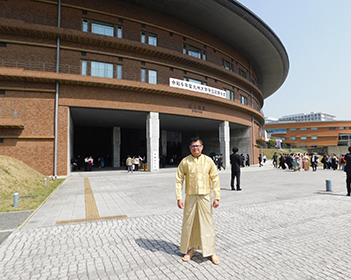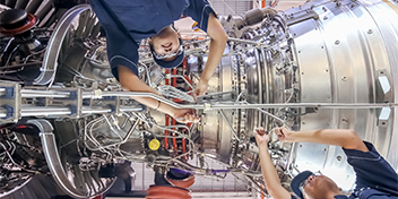What/who inspired you to become an engineer?
From a young age, I enjoyed analysing and understanding how things functioned. This innate curiosity laid the foundation for my passion for engineering. My mathematics teacher, who is talented in creativity and critical thinking, inspired me to become an engineer. Throughout my education, I gravitated towards subjects that challenged my problem-solving abilities, particularly mathematics and science. These disciplines provided the tools to analyse and address complex issues, reinforcing my desire to pursue a career where I could make meaningful contributions. The more I learned about engineering, the more I realised its potential to drive innovation and solve real-world problems. In essence, my journey into engineering is a blend of curiosity, and a commitment to making a difference. It's a path that aligns with my values and aspirations, and I am eager to continue exploring the vast opportunities this field presents.
Please describe your role within the workplace.
As a deputy manager, my role encompasses a diverse range of responsibilities aimed at ensuring the management of engineering projects, equipment design, plant performance evaluation, engineering meetings with customers and operation management of power generation facilities design. I oversee engineering projects related to new plants, manage budgets, timelines, and resources to ensure successful implementation. I also lead a team of engineers and provide guidance, training, and support to foster a collaborative and high-performing work environment.
What is the most challenging aspect of your role?
One of the most challenging aspects of my role is managing unpredictable downtime and outages. Power plants are complex systems that require continuous monitoring to ensure optimal performance. However, unexpected equipment failures, grid disturbances, or other unforeseen events can lead to unplanned downtime, resulting in lost revenue, increased costs, and potential safety risks.
What is the most enjoyable aspect of your role?
One of the most enjoyable aspects of my role is the opportunity to engage in dynamic problem-solving and continuous learning. Each day presents unique challenges that require me to apply my technical expertise to ensure the efficient and safe operation of the plant. This aspect of the job keeps the work both intellectually stimulating and rewarding. The collaborative nature of the role allows me to work closely with a diverse team of professionals, fostering a sense of camaraderie and shared purpose. This teamwork not only contributes to personal job satisfaction but also plays a crucial role in achieving the collective goals of the power plant projects. Additionally, the combination of technical challenges, continuous learning, and teamwork makes it enjoyable and professionally rewarding.
What is the biggest career highlight or achievement you’re most proud of?
One of my most significant career highlights would be the successful completion of the Open-Cycle Gas Turbine Project based in Singapore. The ability to manage such a complex project, ensuring it was completed on time and within budget, demonstrates technical expertise and project management skills. Additionally, my role in mentoring and training junior engineers is a source of pride. By sharing knowledge and experience, I contributed to building a skilled and competent team, fostering a culture of continuous learning and improvement within the organisation. These accomplishments highlight my dedication to enhancing plant operations, promoting sustainability, and developing future engineering talent, all of which are commendable achievements in my career as a Power Plant Engineer.
Why did you choose to become professionally registered?
Choosing to become a professionally registered Chartered Engineer (CEng) was a pivotal decision in my career, driven by a commitment to excellence, professional growth, and a desire to contribute meaningfully to the engineering field. Achieving chartered status signifies that my engineering knowledge, skills, and experience have been rigorously assessed and validated against internationally recognised standards. This independent verification not only enhances my credibility but also assures employers and clients of my technical expertise and professional integrity. Holding a CEng title has enabled me to take on complex projects with greater responsibility, influencing strategic decisions and driving innovation within my organisation. In addition, the CEng title is globally recognised, facilitating my ability to work on international projects and collaborate with engineers worldwide. This international mobility has enriched my professional experiences and broadened my perspective on global engineering practices.
I would recommend professional registration because…
I would recommend pursuing professional registration because it offers numerous benefits that can significantly enhance your engineering career and demonstrates that the competency has been independently assessed against rigorous standards, enhancing credibility among employers, clients, and peers. Additionally, becoming a CEng not only validates the expertise but also provides opportunities for career growth, higher earnings, international mobility, and committing to continuous professional development and ethical practice.
What career advice would you give to your younger self?
Engineering is an ever-evolving field. Pursuing certifications, attending workshops, and staying updated with industry advancements are crucial for long-term success. The demanding nature of engineering roles can lead to burnout. Maintaining a balanced lifestyle through regular exercise, proper nutrition, and adequate rest is vital for sustained performance and job satisfaction. My last advice is “keep learning and continue growing”.
Do you participate in mentoring, volunteering, or membership of other engineering groups?
Yes, I actively participate in mentoring, volunteering, and membership in various engineering groups, as I believe these activities are integral to personal and professional growth. Engaging in these activities allows me to contribute to the development of future engineers, stay connected with industry advancements, and continuously improve my own skills and knowledge.
If relevant, please list three favourite projects you have worked on.
All of the projects are interesting, and full of challenges. I cannot nominate only three favourite projects.









